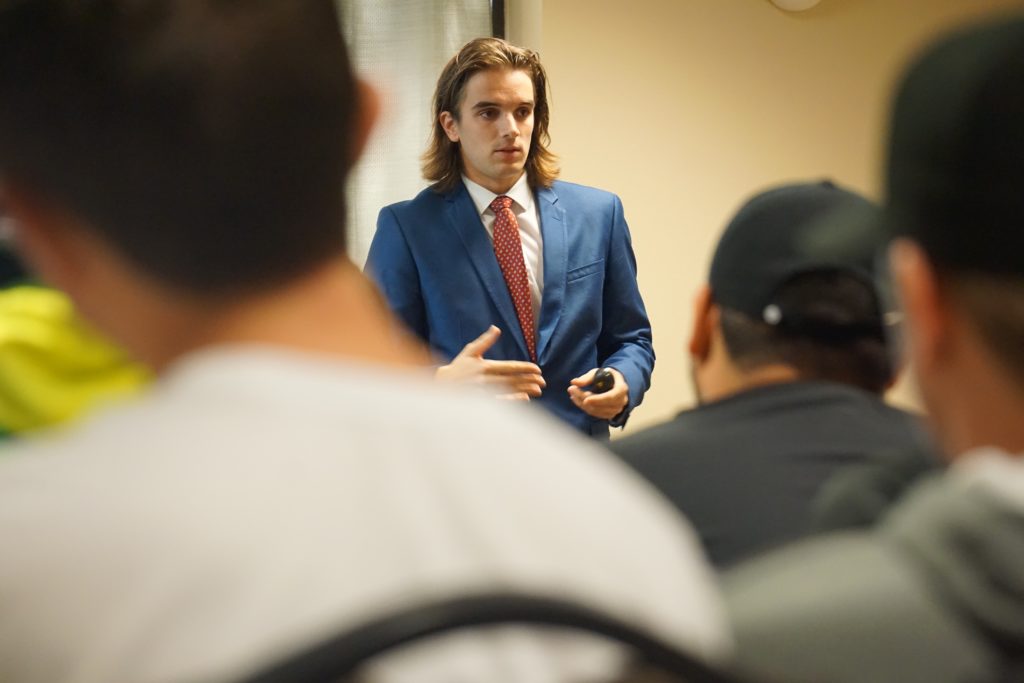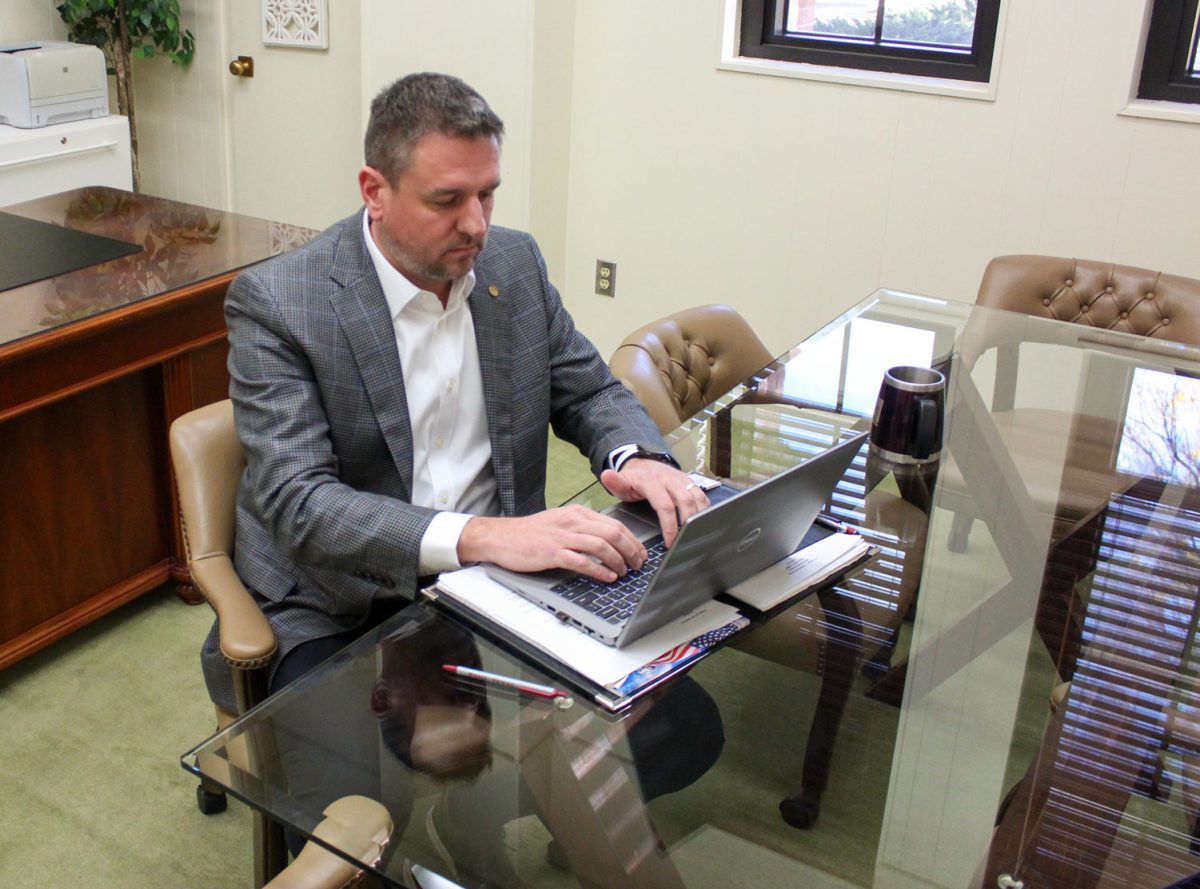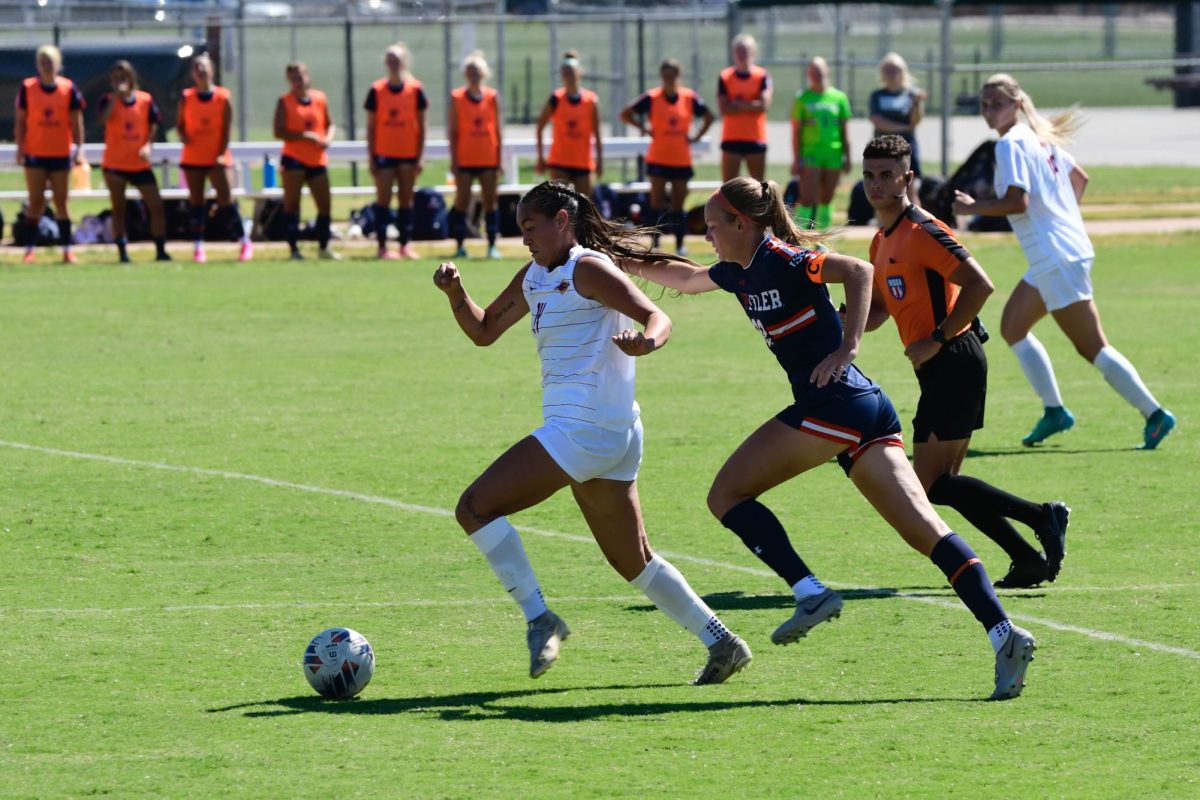
Undergraduate Research and Creative Activities Forum
- When: Nov. 17
- Where: Clark Student Center
- Poster presentations: 39
- Oral presentations: 39
Student perspectives
How did you get the data for your presentation together? “Every year at the end of clinical teaching we have a wrap up meeting and they do the note card survey so we took last years note card survey read all through them and we started pointing out things that were repetitive and what people had similar experiences and how they felt about clinical teaching.” | Madelyn Johnson, early childhood education senior
What made you want to do your project over early childhood education? “We are doing student teaching right now so we just decided to incorporate that to make it easier.” | Brittany Brown, early education senior
What were you presenting today? “My presentation was on predicting price momentum in currency markets using evidence from simulations.” | Luca Lalor, business finance senior
What is the research project that you worked on? Why did you choose this topic? “A planetary control based system for a wind turbine. This is actually part of our senior design…it’s a class we have to take as engineering students, so this is a culmination or all our classes that we use.” | Travis Taylor, senior mechanical engineering
How have you liked working with EURECA this semester? “EURECA was great experience this semester; I learned a lot, I’m happy I did it. I would recommend this program to everyone.” | Luca Lalor, business finance senior
Do you ever get nervous before speaking to a crowd? If so, how do you handle it? “Sometimes would get a bit nervous, I try no to show it. As long as you don’t show signs of nervousness you should be fine.” | Luca Lalor business finance senior
What’s something you took away from doing your research? “What I realized is that I would like to find a way to solve this problem and not just investigate it. Maybe this research was a step in figuring out how to solve it.” | Dom Cho, sports and leisure studies senior
What is your most exciting thing about your presentation? “Actually putting original research out to students who are interested in my topics.” | Lisa Diemer, environmental science senior
How was your experience with EURECA? “It’s been fun, a learning experience, and I agree that all students should participate every time they get the chance.” | Lisa Diemer, environmental science senior
What is the purpose of your presentation? “To try to help the organization grow the numbers of membership and quality participation. Also, to give ideas to the younger audience who may not understand the organization completely.” | Wadzanai Dzvurumi, psychology senior
How long did it take you to put this together? “It took us all semester. We had to interview four people who joined the organization to get their input on how it has helped them.” |Wadzanai Dzvuruml, psychology senior
Why did you volunteer to work this event? “I volunteered because it’s always good to see students put themselves out there. I have a front row seat where I can see everything. My favorite presentation that I’ve seen in presentation 21 which is about information technology. I like it because it was engineers doing something that was really to do with engineering.” | Marla Buffong, accounting senior
How are you feeling about giving your presentation? “I’m a little anxious, but I’m excited. For my presentation, I looked at imaging technology and how it impacts the military. I’m a radiology major and I’m from a military family, so I wanted to explore my roots in the field I am studying.” | Camille Khan, radiology sophomore
What was your project over? “We are doing heat transfer tech to convert plastic trash to all yield fuels such as gasoline.” How did you create fuel from plastic? “First we put plastic into a sort of reactor and heat it up to 400-500˚C, the whole system is sealed so the plastic becomes a gas, so we heat plastic then boil it to vapor in reactor and towards the end we condense it to the liquid or fuel.” Is the end result clean fuel? “Technically the end result is a mix between the fuels, and we are testing it out to see what kind of fuel we yield and their applications.” | Zihiqi Mao, chemical engineering“I got to learn about the U.S. Army as a foreign exchange student because of my research.” | Baskaran Ravi Prasanth, mechanical engineering senior
Student @paige_breanna14 checks in to the Undergraduate Research & Creativity Activity Forum for extra credit. @MWSU_UGR @WichitanOnline pic.twitter.com/JOnxN737us
— Kelsey Purcell (@PurcellKelsey) November 17, 2016
“I enjoyed taking on tasks that will apply to what I will do later in life. I got to break down problems and put them back together for a solution.” | Kevin Ellis, computer science junior
“We got to study a topic that was near and dear to our hearts. I liked seeing what other people have studied and learned about this topic.” | Lacy Ashford, social work junior
“I love the field. I’m really happy with my major, seeing as how it’s one of those that lets me go out in the field. My mentor thought this topic would be perfect for me, and I entirely agree. This kind of thing helps us better understand all of the things that affect and are affected by geology.” | Alexandria Weiskircher, geology junior
“We started at the end of the spring, kind of put things down in the summer, then really hit the ground running in August.” | Alexandria Weiskircher, geology junior
“My group chose secondary traumatic stress with law enforcement and Child Protective Services dealing with child welfare, in particular child abuse. We wanted to know how they (the workers) deal with stress. What is the causing factor to the stress? We found the highest stressor is not enough time with researching on cases to help the families.” | Lacy Ashford, social work junior
“International students ability to adjust to college amongst the cultures within MSU and how they’re able to handle that. We found international students are more adjusted academic-wise, but when it comes to social adjustment, they actually just stick to their same culture. They don’t really associate as much with American students.” | Nisa Cruz, social work junior
“We wanted to show precisely how international students adapt to the stress of American culture academically and socially.” | Kinisha Morris, social work junior
“It was very productive and rewarding, however it took a very long time to do. The end product definitely met our expectations.” | Delize Paul, social work senior
“The study ultimately revealed that international students adjust better to the educational aspect than the cultural aspect of college life in the U.S.” | Estrella Cruz, social work junior
“Our professor recommended it to us and conducting this type of study can help with providing jobs for people. It was great because it provided a real-life visual analysis.” | Anthony Enim, computer science junior
“It was successful to some degree, however there are factors such as weather which cause significant problems making it difficult to implement right away,” | Kevin Ellis, computer science junior
“Because I am not a traditional college student I though that this was an interesting topic to study. It hits close to home and it was something that I felt I could take a personal interest in. Luckily I was able to get my group members interested in it as well.” | Andrea Fagnani, social work junior
“We found that finances, jobs outside school and just the general stress of becoming a student after a long layoff has a big effect on the success of the student. We also found that African-Americans experienced the most amount of stress mainly because in general they weren’t as prepared. We also found that the stress level in sophomores was higher than juniors or seniors.” | Andrea Fagnani, social work junior
“I personally thought that law enforcement officers would experience more stress. I figured that because they were first on scene they would see all the tough stuff.” | Lacey Ashford, social work junior
“I was wrong, I thought police officers would experience more stress but it was actually the social workers that experienced more stress. I think this is because social workers are more involved with the cases, not to mention they are usually more overworked than police officers who have a set schedule. Social workers often go above and beyond what their duties are, meaning more hours on the job and added stress.” | Lacey Ashford, social work junior
“From start to finish, it took us six months. We started in January and presented in July at the Texas Society of Respiratory Care, which was our ultimate goal.” | Emma Davenport, radiology senior
“It took me awhile, I had to start with observations, which was four nights of no sleep.” | Sachithra Weerasooriya, physics junior
“EURECA supported us after (we presented at the Texas Society of Respiratory), so that’s why we are here today, this wasn’t our original goal, it just kind of happened.” | Emma Davenport, radiology senior
“Well actually I already presented, I presented at Physcon 2016 on Nov. 5 in Silicon Valley, California. It’s the largest undergraduate conference for Physics students.” | Sachithra Weerasooriya, physics junior
Faculty perspectives
Do you have any helpful hints to tell future researchers? “This is something I had my students do when I was a research professor is to, every week at the end of the week, write down a ‘weekly’ which is a log with summaries for what you got done for the week and what you want to get done next week.” | Mitzi Lewis, associate professor
So you are judging the presentations. What have you thought about the presentations so far? “I just think about how I was at their age, and they just seem to have poise, articulation, and a command of the situation.” | John Martinez, professor of economics
What new things specifically have you learned about while judging the posters that you thought were so interesting? “l learned about using computer technology to detect open parking spots in parking lots.” | Jon Scales, assistant professor of biology
What research projects did you work with students on? Why did you choose these topics? “One worked on studying the presence of the chlorophyl in a non photo-synthetic orchid. The second one is one that did a study of our museum’s collection of bird specimens. These were just projects that we had never really tried before because there wasn’t someone working on them.” | Marcy Brown Marsden, dean of the college of science and math
Tell me how you feel about today’s event. “I am excited. This is what we, and the students, work towards all semester.” | Apryl Webb, secretary of the office of undergraduate research
What is your favorite presentation? “My favorite has been the learning communities presentation.” | Angie Reay, associate residence life director
What was the project over? “Two groups one studied non photosynthetic orchid to detect if it had chlorophyll.” How was the experiment conducted? “We did a lot of lab work and utilized chemicals such as either and acetone along with and spectrophotometer photometry. Using these tools students pull chemicals out of the tissue, which allows you to take out the cells and allows you view the liquid that contains cell.” When was the experiment conducted? “The experiment was conducted over the last semester, and last week was the last of analysis” | Marcy Brown Marsden, dean college of science and mathematics.
“Being able to conduct independent research is one of the most powerful skills a student can have.” – Dr. Suzanne Shipley @MWSU_UGR pic.twitter.com/3YV3cuQ7wY
— Brendan (@brndanwynn) November 17, 2016
“I’m amazed by just how varied it is. When many people hear ‘research’ they think you have to be some kind of scientist, but if you look around you can see just how many studies we have. Bullying, sexual harassment, so many different things that these students have delved into in-depth and it’s extremely informative and fascinating. Look how empowering this is. It lights up the imagination, and when students have that “eureka” moment when they realize they’ve really found something significant, it’s just incredible.” | Suzanne Shipley, university president
“Being able to conduct independent research is one of the most powerful skills a student can have. I encourage every student, at some point, to get involved with any sort of independent research. It may just be the most illuminating experience you can have during the span of your education.” | Suzanne Shipley, university president
Award List
Dillard College of Business Administration
Best Oral Presentation
- 1st place: William Ash| On the Effect of Remittances on Poverty through Human Capital in Developing Countries: Are Developing Regions Different? | Mentor: Dr. Pablo A. García-Fuentes
- 2nd place: Kevin Thompson | An Instrumental Variable Estimation of the Effect of Remittances and Human Capital on Financial Development in Developing Countries | Mentor: Dr. Pablo A. García-Fuentes
Best Poster Presentation
- 1st place: Wadzanai Dzvurumi and Careisha Whyte | The Challenge of Attracting and Retaining Member-Volunteers at YPWF | Mentor: Dr. Niyati Kataria, Mr. Newman Wong, and Dr. Jeff Stambaugh
- 2nd place: Careisha Whyte and Catherine Stepniak | Creating a Digital Newsletter for a Non-profit Professional Organization | Mentors: Mr. Newman Wong and Dr. Bradley Wilson
Gunn College of Health Sciences & Human Services
Best Poster Presentation
- 1st place: Michaela Coonce, Emma Davenport and Sarah Flagg | Gone Too Soon… Exploring Coping Strategies of NICU Therapists | Mentor: Dr. Jennifer Anderson
- 2nd place: | Montie Hopper, Emily Jones, LeeAnn Reyes and Stephanie Omeodu | Effects of Workplace Bullying Among Nurses | Mentor: Dr. Packiaraj Arumugham
Best Oral Presentation
- TIE: Phillip Carr | The Anatomage® Table: Activities to Enhance Student Learning | Mentor: Dr. Beth L. Vealé
- TIE: Camille Khan | Imaging Technology in Military Conflict | Mentor: Dr. Robert Comello
Prothro-Yeager College of Humanities & Social Sciences
Best Oral Presentation
- 1st place: | Austin Monson | Bridging the Gap: The Wichita Falls Symphony Orchestra and the Next Generation of Music Lovers | Mentors: Dr. Todd Giles and Dr. Andrea Button
- 2nd place: Caitlin McNeely | Having the Last Laugh: Humor as a Feminist Rhetorical Tool | Mentor: Dr. Kristen Garrison
Best Poster Presentation
- 1st place: Wadzanai Dzvurumi and Careisha Whyte | The Challenge of Attracting and Retaining Member-Volunteers at YPWF | Mentor: Dr. Niyati Kataria, Mr. Newman Wong, and Dr. Jeff Stambaugh
- 2nd place: Careisha Whyte and Catherine Stepniak | Creating a Digital Newsletter for a Non-profit Professional Organization | Mentors: Mr. Newman Wong and Dr. Bradley Wilson
College of Science and Mathematics
Best Oral Presentation
- 1st place: Romeo Botelua, Trevor Criddle, Xin Hu, Chase Meyer, Michael A. Olaya | Development of a Muon Tomography Imaging System | Mentor: Dr. Yu Guo
- 2nd place: Bacterial Endophytes in Seeds with High and Low Melatonin Content: Survival Implications | Meaghan Rose | Mentor: Dr. Magaly Rincón-Zachary and Dr. James Masuoka
Best Poster Presentation
- 1st place: Chanuka Perera and Suman Bhandari | Sodium and Chlorine Ions Concentration Mapping in Saltwater | Mentor: Dr. Salim Azzouz
- 2nd place: Beth Russell | Mechanisms of Reversion to Erythromycin-Susceptibility in Erythromycin-Resistant Bacteria | Mentor: Dr. James Masuoka
West College of Education
Best Oral Presentation
- 1st place: Bridget Alaniz | The Effect of Teaching Strategies on Student Engagement in High School Science | Mentor: Dr. Suzanne Lindt
- 2nd place: Jocelyn Brown and Tamra Woods | The Effect of STEM and STEAM Units on Pre-service Teachers | Mentor: Dr. Dittika Gupta
Best Poster Presentation
- 1st place: Francine Baron and Laura Sorge | Student Perceptions of Benefits of Learning Communities | Mentor: Dr. Kym Acuña
- 2nd place: Nicole Anderson | The Effects of D2L Literature Circles on Teacher Efficacy | Mentors: Dr. Emily Reeves, Dr. Leann Curry, Dr. Christina McIntyre
Lamar D. Fain College of Fine Arts
Best Oral Presentation
- 1st place: Emma Griffiths | Constructing an Online Studio Art Class: Transitioning from a Conventionally Taught Drawing I Course to an Online Class using iPads
Best Poster Presentation
- 1st place: Careisha Whyte and Catherine Stepniak | Creating a Digital Newsletter for a Non-profit Professional Organization | Mentors: Mr. Newman Wong and Dr. Bradley Wilson
Most Creative and Original Presentation
- Wadzanai Dzvurumi and Careisha Whyte |The Challenge of Attracting and Retaining Member-Volunteers at YPWF | Mentors: Dr. Niyati Kataria, Mr. Newman Wong, and Dr. Jeff Stambaugh
Best Interdisciplinary Presentation
- Jocelyn Brown and Tamra Woods | The Effect of STEM and STEAM Units on Pre-service Teachers | Mentor: Dr. Dittika Gupta
CORRECTION: An earlier version of this story misquoted Jon Scales. The quotation has been fixed. The Wichitan apologizes for the error.













Jon Scales • Nov 18, 2016 at 8:07 AM
What new things specifically have you learned about while judging the posters that you thought were so interesting? “I learned about using computer technology to open spots in parking lots.” | Jon Scales, assistant professor of biology
No, I said ” l learned about using computer technology to DETECT open PARKING spots in parking lots”